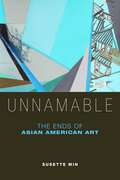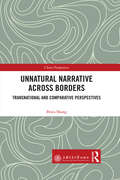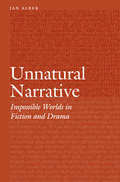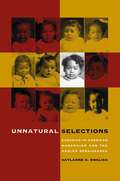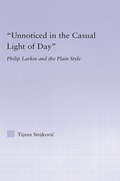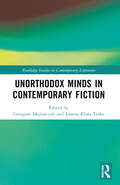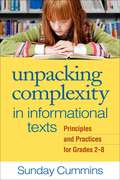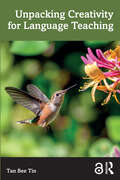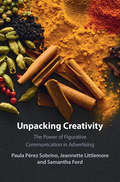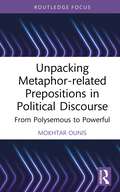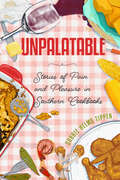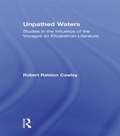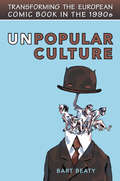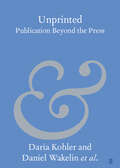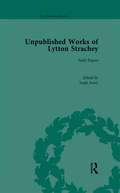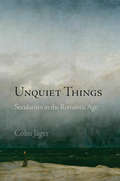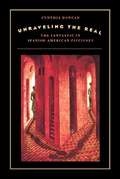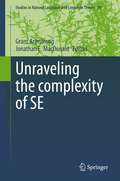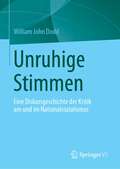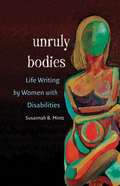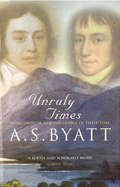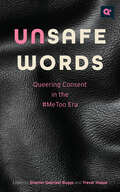- Table View
- List View
Unnamable: The Ends of Asian American Art
by Susette MinRedraws the contours of Asian American art, attempting to free it from a categorization that stifles more than it reveals. Charting its historical conditions and the expansive contexts of its emergence, Susette Min challenges the notion of Asian American art as a site of reconciliation or as a way for marginalized artists to enter into the canon or mainstream art scene. Pressing critically on the politics of visibility and how this categorization reduces artworks by Asian American artists within narrow parameters of interpretation, Unnamable reconceives Asian American art not as a subset of objects, but as a medium that disrupts representations and embedded knowledge. By approaching Asian American art in this way, Min refigures the way we see Asian American art as an oppositional practice, less in terms of its aspirations to be seen—its greater visibility—and more in terms of how it models a different way of seeing and encountering the world. Uniquely presented, the chapters are organized thematically as mini-exhibitions, and offer readings of select works by contemporary artists including Tehching Hsieh, Byron Kim, Simon Leung, Mary Lum, and Nikki S. Lee. Min displays a curatorial practice and reading method that conceives of these works not as “exemplary” instances of Asian American art, but as engaged in an aesthetic practice that is open-ended. Ultimately, Unnamable insists that in order to reassess Asian American art and its place in art history, we need to let go not only of established viewing practices, but potentially even the category of Asian American art itself.
Unnatural Narrative across Borders: Transnational and Comparative Perspectives (China Perspectives)
by Biwu ShangThis book actively engages with current discussion of narratology, and unnatural narrative theory in particular. Unsatisfied with the hegemony of European and Anglo-American narrative theory, it calls for a transnational and comparative turn in unnatural narrative theory, the purpose of which is to draw readers’ attention to those periphery and marginalized narratives produced in places other than England and America. It places equal weight on theoretical exploration and critical practice. The book, in addition to offering a detailed account of current scholarship of unnatural narratology, examines its core issues and critical debates as well as outlining a set of directions for its future development. To present a counterpart of Western unnatural narrative studies, this book specifically takes a close look at the experimental narratives in China and Iraq either synchronically or diachronically. In doing so, it aims, on the one hand, to show how the unnatural narratives are written and to be explained differently from those Western unnatural narrative works, and on the other hand, to use the particular cases to challenge the existing narratological framework so as to further enrich and supplement it. The book will be useful and inspiring to those scholars working in such broad fields as narrative theory, literary criticism, cultural studies, semiotics, media studies, and comparative literature and world literature studies.
Unnatural Narrative: Impossible Worlds in Fiction and Drama (Frontiers of Narrative #9)
by Jan AlberA talking body part, a character that is simultaneously alive and dead, a shape-changing setting, or time travel: although impossible in the real world, such narrative elements do appear in the storyworlds of novels, short stories, and plays. Impossibilities of narrator, character, time, and space are not only common in today’s world of postmodernist literature but can also be found throughout the history of literature. Examples include the beast fable, the heroic epic, the romance, the eighteenth-century circulation novel, the Gothic novel, the ghost play, the fantasy narrative, and the science-fiction novel, among others.Unnatural Narrative looks at the startling and persistent presence of the impossible or “the unnatural” throughout British and American literary history. Layering the lenses of cognitive narratology, frame theory, and possible-worlds theory, Unnatural Narrative offers a rigorous and engaging new characterization of the unnatural and what it yields for individual readers as well as literary culture. Jan Alber demonstrates compelling interpretations of the unnatural in literature and shows the ways in which such unnatural phenomena become conventional in readers’ minds, altogether expanding our sense of the imaginable and informing new structures and genres of narrative engagement.
Unnatural Selections
by Daylanne K. EnglishChallenging conventional constructions of the Harlem Renaissance and American modernism, Daylanne English links writers from both movements to debates about eugenics in the Progressive Era. She argues that, in the 1920s, the form and content of writings by figures as disparate as W. E. B. Du Bois, T. S. Eliot, Gertrude Stein, and Nella Larsen were shaped by anxieties regarding immigration, migration, and intraracial breeding. English's interdisciplinary approach brings together the work of those canonical writers with relatively neglected literary, social scientific, and visual texts. She examines antilynching plays by Angelina Weld Grimke as well as the provocative writings of white female eugenics field workers. English also analyzes the Crisis magazine as a family album filtering uplift through eugenics by means of photographic documentation of an ever-improving black race.English suggests that current scholarship often misreads early-twentieth-century visual, literary, and political culture by applying contemporary social and moral standards to the past. Du Bois, she argues, was actually more of a eugenicist than Eliot. Through such reconfiguration of the modern period, English creates an allegory for the American present: because eugenics was, in its time, widely accepted as a reasonable, progressive ideology, we need to consider the long-term implications of contemporary genetic engineering, fertility enhancement and control, and legislation promoting or discouraging family growth.
Unnoticed in the Casual Light of Day: Phillip Larkin and the Plain Style (Studies in Major Literary Authors)
by Tijana StojkovicLarkin's poems are often regarded as falling somewhere between the traditional 'plain' and the more contemporary 'postmodern' categories. This study undertakes a comprehensive linguistic and historical study of the plain style tradition in poetry, its relationship with so-called 'difficult' poetry, and its particular realization in the cultural and historical context of 20th-century Britain. The author examines the nature of poetry as a type of discourse, the elements of, and factors in, the development of literary styles, a close rhetorical examination of Larkin's poems within the described poetic frameworks, and his position in the British twentieth-century poetic canon.
Unorthodox Minds in Contemporary Fiction (Routledge Studies in Contemporary Literature)
by Grzegorz Maziarczyk Joanna Klara TeskeUnorthodox Minds in Contemporary Fiction seeks to provide an overview of the ways in which broadly understood contemporary fiction envisions, explores and engenders minds going beyond the classical models. The opening essay discusses the complex relationships between such innovative concepts of the mind and experimental techniques for presenting mentality. The chapters which follow focus on (dis)embodied and/or extended mind, virtuality of avatar minds, intermental thought of reader communities, the capability of artificial intelligence (and humans) for genuine selfless love, the interplay between technology and affect in posthuman consciousness. The books under discussion include Murmur by Will Eaves, The Unfortunates by B.S. Johnson, The Satanic Verses by Salman Rushdie, H(A)PPY by Nicola Barker and Machines Like Me by Ian McEwan. A piece of conceptual fiction by Steve Tomasula, one of the most innovative American novelists of our times, exploring the human mind’s alleged power to transcend its biological limits, complements these scholarly inquiries.
Unpacking Complexity in Informational Texts
by Sunday CumminsTo acquire content knowledge through reading, students must understand the complex components and diverse purposes of informational texts, as emphasized in the Common Core State Standards (CCSS). This practical book illuminates the ways in which a text's purpose, structure, details, connective language, and construction of themes combine to create meaning. Classroom-tested instructional recommendations and "kid-friendly" explanations guide teachers in helping students to identify and understand the role of these elements in different types of informational texts. Numerous student work samples, excerpts from exemplary books and articles, and a Study Guide with discussion questions and activities for professional learning add to the book's utility.
Unpacking Creativity for Language Teaching
by Tan Bee TinBefore unlocking creativity, we must first unpack what it means. In this book, creativity is unravelled from various perspectives and the relevance for language teaching and learning is explored. Tin offers a coherent discussion of creativity, adopting an inclusive and integrated but, at the same time, focused approach to creativity. Divided into 12 chapters, the book covers: A critical review of the way the term ‘creativity’ is used, defined and written about in various disciplines Various models and theories of creativity, the product- and process-oriented views of creativity and their relevance for language teaching Three pillars on which creative language pedagogy should be based Over 60 practical tasks, applying theoretical arguments and principles of creativity to language teaching and learning Based on the author’s own practice and research on creativity over the last two decades, the book provides exciting new ideas for scholars and practitioners interested in creativity and creative language pedagogy. The book serves as an important contribution for students, teachers and scholars in the field of applied linguistics, language teaching and education.
Unpacking Creativity: The Power of Figurative Communication in Advertising
by Jeannette Littlemore Paula Pérez Sobrino Samantha FordFigurative communication (the use of metaphor, metonymy, hyperbole and irony) provides economy of expression, clarity, persuasiveness, politeness, evaluation, and communication of emotions. However, it also increases the potential for misunderstanding in situations when people lack shared background knowledge. This book combines theoretical frameworks with empirical studies that measure the effectiveness of different approaches to the use of figurative language in advertisements, to show how to maximise the benefits of creative metaphor and metonymy in global advertising. It highlights how subtle differences in colour, layout, and combinations of different kinds of figurative language affect the reception and appreciation of creative advertising, shedding new light on the nature of figurative communication itself. With a balance between theory, experiments and practical case studies, this book is accessible for academics in linguistics and communication studies, as well as advertising and marketing professionals.
Unpacking Metaphor-related Prepositions in Political Discourse: From Polysemous to Powerful (Routledge Research on New Waves in Pragmatics)
by Mokhtar OunisThis book explores the context around why English prepositions are used in figurative language more frequently than nouns and verbs, using corpus-based evidence to examine the most often used prepositions and how they are employed and for what purpose. While research on cognitive approaches to metaphor has significantly expanded in recent decades, little attention has been paid to prepositions as vehicles of figurative language, owing to their polysemous, complex, and inconsistent nature. To bridge this gap, Ounis introduces an innovative conceptual framework that integrates conceptual metaphor theory, diachronic linguistics, and discourse pragmatics. Drawing upon an extensive corpus of American presidential inaugural addresses, this book considers the linguistic, conceptual, pragmatic, and contextual dimensions of English prepositions, revealing the fascinating interplay between language, culture, and cognition. This volume will be of interest to scholars in pragmatics, metaphor studies, English language, rhetoric studies, and historical linguistics.
Unpacking My Library: Writers and Their Books
by Leah PriceThis gorgeous second volume in the popular Unpacking My Library series explores the bookshelves of favorite novelists. 208 pp.
Unpalatable: Stories of Pain and Pleasure in Southern Cookbooks (Ingrid G. Houck Series in Food and Foodways)
by Carrie Helms TippenThe cookbook genre is highly conventional with an orientation toward celebration and success. From glossy photographs to heartwarming stories and adjective-rich ingredient lists, the cookbook tradition primes readers for pleasure. Yet the overarching narrative of the region is often one of pain, loss, privation, exploitation, poverty, and suffering of various kinds. While some cookbook writers go to great lengths to avoid reminding readers of this painful past, others invoke that pain as a marker of southern authenticity. Still others use stories of southern suffering as an opportunity to make space for reconciliation, reparation, or apology for past wrongs. In Unpalatable: Stories of Pain and Pleasure in Southern Cookbooks, author Carrie Helms Tippen attempts to understand the unique rhetorical situation of the southern cookbook as it negotiates a tension between the expectations of the genre and the prevailing metanarratives of the southern experience, one focused on pleasure and the other rooted in pain. Through an analysis of commercially published “southern” cookbooks from the 1990s to the present, Tippen examines the range of rhetorical purposes and strategies writers have employed, some of which undermine the reality of a painful past and cause harm or violence, and others which serve as tools for truth and reconciliation.
Unpathed Waters: Studies in the Influence of the Voyages on Elizabethan Literature
by Robert R CawleyFirst Published in 1968. Routledge is an imprint of Taylor & Francis, an informa company.
Unpopular Culture: Transforming the European Comic Book in the 1990s
by Bart BeatyIn the last fifteen years or so, a wide community of artists working in a variety of western European nations have overturned the dominant traditions of comic book publishing as it has existed since the end of the Second World War. These artists reject both the traditional form and content of comic books (hardcover, full-colour 'albums' of humour or adventure stories, generally geared towards children), seeking instead to instil the medium with experimental and avant-garde tendencies commonly associated with the visual arts. Unpopular Culture addresses the transformation of the status of the comic book in Europe since 1990. Increasingly, comic book artists seek to render a traditionally degraded aspect of popular culture un-popular, transforming it through the adoption of values borrowed from the field of 'high art.' The first English-language book to explore these issues, Unpopular Culture represents a challenge to received histories of art and popular culture that downplay significant historical anomalies in favour of more conventional narratives. In tracing the efforts of a large number of artists to disrupt the hegemony of high culture, Bart Beaty raises important questions about cultural value and its place as an important structuring element in contemporary social processes.
Unprinted: Publication Beyond the Press (Elements in Publishing and Book Culture)
by Daria Kohler Daniel Wakelin Natascha Domeisen Daniel Haywood Edward Jones Micah Mackay Rosie Maxton Brian M. Moore Katie Noble Felix M. Simon Daniel WojahnThis Element explores the idea of publication in media used before, alongside, and after print. It contrasts multiple traditions of unprinted communication in their diversity and particularity. This decentres print as the means for understanding publication; instead, publication is seen as an heuristic term which identifies activities these traditions share, but which also differ in ways not reducible to comparisons with printing. The Element engages with texts written on papyrus, chiselled in stone, and created digitally; sung, proclaimed, and put on stage; banned, hidden and rediscovered. The authors move between Greek inscriptions and Tibetan edicts, early modern manuscripts and AI-assisted composition, monasteries and courts, constantly questioning the term 'publication' and considering the agency of people publishing and the publics they address. The picture that transpires is that of a colourful variety of contexts of production and dissemination, underlining the value of studying 'unprinted' publication in its own right.
Unpublished Works of Lytton Strachey (The Pickering Masters)
by Todd AveryA core member of the Bloomsbury Group, Lytton Strachey (1880–1932) is recognized for his radical influence on the new school of psychological biography. This volume collects for the first time Strachey’s previously unpublished essays, dialogues and stories.
Unquiet Things
by Colin JagerIn Great Britain during the Romantic period, governmental and social structures were becoming more secular as religion was privatized and depoliticized. If the discretionary nature of religious practice permitted spiritual freedom and social differentiation, however, secular arrangements produced new anxieties. Unquiet Things investigates the social and political disorders that arise within modern secular cultures and their expression in works by Jane Austen, Horace Walpole, Samuel Taylor Coleridge, Lord Byron, and Percy Shelley among others.Emphasizing secularism rather than religion as its primary analytic category, Unquiet Things demonstrates that literary writing possesses a distinctive ability to register the discontent that characterizes the mood of secular modernity. Colin Jager places Romantic-era writers within the context of a longer series of transformations begun in the Reformation, and identifies three ways in which romanticism and secularism interact: the melancholic mood brought on by movements of reform, the minoritizing capacity of literature to measure the disturbances produced by new arrangements of state power, and a prospective romantic thinking Jager calls "after the secular." The poems, novels, and letters of the romantic period reveal uneasy traces of the spiritual past, haunted by elements that trouble secular politics; at the same time, they imagine new and more equitable possibilities for the future. In the twenty-first century, Jager contends, we are still living within the terms of the romantic response to secularism, when literature and philosophy first took account of the consequences of modernity.
Unraveling the Real: The Fantastic in Spanish-American Ficciones
by Cynthia DuncanIn literary and cinematic fictions, The fantastic blurs the lines between reality and fantasy. Lacking a consensus on definition, critics often describe the fantastic as supernatural, or similar to, but quite different from fantasy, science fiction, and magical realism. InUnraveling the RealCynthia Duncan provides a new theoretical framework for discussing how the fantastic explores both metaphysical and socially relevant themes in Spanish American fictions. Duncan deftly shows how authors and artists have used this literary genre to convey marginalized voices as well as critique colonialism, racism, sexism, and classism. Selecting examples from the works of such noted writers as Jorge Luis Borges, Julio Cortazar, and Carlos Fuentes, among others, she shows how capacious the concept is, and why it eludes standard definition. Challenging the notion that the fantastic is escapist in nature,Unraveling the Realshows how the fantastic has been politically engaged throughout the twentieth century, often questioning what is real or unreal. Presenting a mirror image of reality, The fantastic does not promote a utopian parallel universe but rather challenges the way we think about the world around us And The cultural legacy of colonialism.
Unraveling the complexity of SE (Studies in Natural Language and Linguistic Theory #99)
by Grant Armstrong Jonathan E. MacDonaldThis book makes a novel contribution to our understanding of Romance SE constructions by combining both diachronic and synchronic theoretical perspectives along with a range of empirical data from different languages and dialects. The collection, divided into four sections, proposes that SE constructions may be divided into one class that is the result of grammaticalization of a reflexive pronoun up the syntactic tree, from Voice and above, and another class that has resulted from the reanalysis of reflexive and anticausative morphemes as an argument expletive or verbal morpheme generated in positions from Voice and below. The contributions, while varied in both empirical content and theoretical approach, all serve to highlight different aspects of the overarching idea that SE constructions have evolved from these two distinct grammaticalization paths. The book appeals to researchers and academics in the field and closes with a unified approach to various SE constructions that makes important use of its status as a verbal morpheme. In addition to aligning a novel string of empirical contributions under a new theoretical umbrella, a clear research direction emerges from this volume based on the morphosyntactic nature of SE itself: Is it a clitic, an agreement morpheme, or a verbal morpheme?
Unruhige Stimmen: Eine Diskursgeschichte der Kritik am und im Nationalsozialismus
by William John DoddIn dieser Diskursgeschichte analysiert W. J. Dodd die "unruhigen Stimmen" von Gegnern, deren zeitgenössische Kritik am Nationalsozialismus sich aus Positionen des territorialen und inneren Exils auf die "Sprache des Nationalsozialismus" konzentrierte. Die einzelnen Kapitel befassen sich mit den "Vorläufer"-Diskursen, dem öffentlichen Diskurs der Nazis von 1933 bis 1945, den Zeugnissen der "unruhigen Stimmen" im Ausland sowie in privaten und veröffentlichten Texten im "Reich", den Versuchen zur "Entnazifizierung der Sprache" (1945-49) und den Hinterlassenschaften der Nazi-Vergangenheit in einem retrospektiven Diskurs der "Aufarbeitung" der Nazi-Vergangenheit. In der Zeit nach 1945 konzentriert sich das Buch auf die Anfechtung der "befleckten Sprache" und die Instrumentalisierung der NS-Vergangenheit sowie auf das Fortbestehen sprachlicher Tabus im zeitgenössischen deutschen Sprachgebrauch. Das Buch, das durchgehend in englischer Übersetzung vorliegt, ist eine unschätzbare Quelle für Wissenschaftler der Diskursanalyse, der Soziolinguistik und der deutschen Geschichte und Kultur sowie für Leser mit einem allgemeinen Interesse an Sprache und Politik.
Unruly Bodies
by Susannah B. MintzThe first critical study of personal narrative by women with disabilities, Unruly Bodies examines how contemporary writers use life writing to challenge cultural stereotypes about disability, gender, embodiment, and identity. Combining the analyses of disability and feminist theories, Susannah Mintz discusses the work of eight American autobiographers: Nancy Mairs, Lucy Grealy, Georgina Kleege, Connie Panzarino, Eli Clare, Anne Finger, Denise Sherer Jacobson, and May Sarton. Mintz shows that by refusing inspirational rhetoric or triumph-over-adversity narrative patterns, these authors insist on their disabilities as a core--but not diminishing--aspect of identity. They offer candid portrayals of shame and painful medical procedures, struggles for the right to work or to parent, the inventive joys of disabled sex, the support and the hostility of family, and the losses and rewards of aging. Mintz demonstrates how these unconventional stories challenge feminist idealizations of independence and self-control and expand the parameters of what counts as a life worthy of both narration and political activism. Unruly Bodies also suggests that atypical life stories can redefine the relation between embodiment and identity generally.
Unruly Times: Wordsworth and Coleridge in Their Time
by A S ByattUnruly Times is a superlative portrait of the relationship between Wordsworth and Coleridge, and a fascinating exploration of the Romantic Movement and the dramatic events that shaped it. With a novelist's insight and eye for detail, A. S. Byatt brings alive this tumultuous period and shows a deep understanding of the effects upon the minds of Wordsworth, Coleridge and their contemporaries - de Quincey, Lamb, Hazlitt, Byron and Keats.
Unruly Women
by Margaret BoyleIn the first in-depth study of the interconnected relationships among public theatre, custodial institutions, and women in early modern Spain, Margaret E. Boyle explores the contradictory practices of rehabilitation enacted by women both on and off stage. Pairing historical narratives and archival records with canonical and non-canonical theatrical representations of women's deviance and rehabilitation, Unruly Women argues that women's performances of penitence and punishment should be considered a significant factor in early modern Spanish life.Boyle considers both real-life sites of rehabilitation for women in seventeenth-century Madrid, including a jail and a magdalen house, and women onstage, where she identifies three distinct representations of female deviance: the widow, the vixen, and the murderess. Unruly Women explores these archetypal figures in order to demonstrate the ways a variety of playwrights comment on women's non-normative relationships to the topics of marriage, sex, and violence.
Unsafe Words: Queering Consent in the #MeToo Era (Q+ Public)
by Gloria González-López Jane Ward Trevor Hoppe Angela Jones Anahi Russo Garrido Alexander Cheves Mistress Velvet D. S. Trumbull Blu Buchanan Shantel Gabrieal Buggs James McMaster Mark S. King V. Jo Hsu Dominique MorganQueer people may not have invented sex, but queers have long been pioneers in imagining new ways to have it. Yet their voices have been largely absent from the #MeToo conversation. What can queer people learn from the #MeToo conversation? And what can queer communities teach the rest of the world about ethical sex? This provocative book brings together academics, activists, artists, and sex workers to tackle challenging questions about sex, power, consent, and harm. While responding to the need for sex to be consensual and mutually pleasurable, these chapter authors resist the heteronormative assumptions, class norms, and racial privilege underlying much #MeToo discourse. The essays reveal the tools that queer communities themselves have developed to practice ethical sex—from the sex worker negotiating with her client to the gay man having anonymous sex in the back room. At the same time, they explore how queer communities might better prevent and respond to sexual violence without recourse to a police force that is frequently racist, homophobic, and transphobic. Telling a queerer side of the #MeToo story, Unsafe Words dares to challenge dogmatic assumptions about sex and consent while developing tools and language to promote more ethical and more pleasurable sex for everyone.
